“Postmenopause is the time after menopause. As your body adjusts to lower hormone levels, you may have less menopausal symptoms – or they may even disappear… ”.1
Umbrella
What may the Postmenopause Umbrella include?
Depending on the Source (DotS) this Umbrella may include:
- After/Beyond Menopause
- Postmenopausal
- Post Menopause/Post-Menopause/Postmenopause
Definition
 What is the definition of postmenopause?
What is the definition of postmenopause?
DotS the definition of postmenopause may vary. The International Menopause Society’s (IMS) definition is:
“Postmenopause – the stage after the final menstrual period”.2
The North American Menopause Society’s (NAMS) definition is:
“Postmenopause includes all the years beyond menopause”.3
The Australasian Menopause Society’s definition is:
“When a woman has had no periods for 12 consecutive months, she is considered to be postmenopausal”.4
FMP
What is FMP?
FMP can be an abbreviation for Final Menstrual Period.
Duration
How long does postmenopause last?
Postmenopause – or after menopause – lasts for the rest of our life. On page two in Prevention of Diseases After Menopause: Introduction the authors elaborate on:
“As the world population increases, along with an increase in life expectancy, many millions of women will be spending a third or more of their lives after menopause”.5
Postmenopause Differences
Do all women experience the same postmenopause?
No. All women do not experience the same postmenopause. Just as different women have a different perimenopause, different women also have a different postmenopause.
Menopause Symptoms
Do menopause symptoms stop when postmenopause starts?
Not necessarily. The (Australian) Jean Hailes for Women’s Health explain:
 “Postmenopause is the time after menopause.
“Postmenopause is the time after menopause.
As your body adjusts to lower hormone levels, you may have less menopausal symptoms – or they may even disappear – but some women still experience menopausal symptoms for years after their final period”.6
Chronic Medical Conditions
Is there an association between chronic medical conditions and postmenopause?
In Menopause: Ensuring A Tranquil Transition: Are There Any Health Risks Associated With Menopause? the (United States) Mayo Clinic explain:
- Cardiovascular disease
The decline in estrogen increases the risk of heart attack and stroke - Osteoporosis
During the first few years after menopause, women may rapidly lose bone density, leading to an enhanced risk for bone fractures - Genitourinary syndrome of menopause
As vaginal tissues lose elasticity, and becomes thin and dry, women may struggle with pain during intercourse. The urethra also becomes dry and irritated, which may increase the risk of infection. Some women may need to urinate more often and may experience leakage, also known as urinary incontinence - Weight gain
Because of the decrease in basal metabolic rate after menopause, women may need to decrease caloric intake and increase exercise to maintain their weight”.7
Postmenopausal Vaginal Bleeding
What if I have postmenopausal vaginal bleeding?
In Postmenopausal Bleeding: What Causes Postmenopausal Bleeding? the (United States) Cleveland Clinic note:
“Vaginal bleeding during postmenopause isn’t a normal side effect of decreasing hormone levels. In some cases, the dryness in your vagina could cause some light bleeding or spotting after sex. In other cases, it could indicate a condition like endometrial hyperplasia or uterine fibroids, infections like endometritis, or cancer. Contact your healthcare provider if you experience any vaginal bleeding so you can be evaluated”.8
Health Care Provider
What if I would like help with my postmenopause?
If you would like help with your postmenopause, it may be in your best interest to choose to talk to your health care provider about this. The IMS remind us:
“The menopause transition should be used as an opportunity to visit your healthcare professional for a check-up, assess potential risks and proactively start to manage later life. Obesity, diabetes, cardiovascular disease, osteoporosis and osteoarthritis, cognitive decline and dementia, depression, and cancer are the key diseases to address”.9
Health Topics A-Z
Where may I find Health Topics A-Z related to Postmenopause?
In Health Topics A-Z you may find:
Links
Where may I find Links related to Postmenopause?
Your Country may have Links similar to:
Links
This Links List to third party websites is neither comprehensive nor exhaustive. Inclusion on this Links List does not imply endorsement or recommendation. Non-inclusion on this Links List does not imply non-endorsement or non-recommendation. Third party websites are not under the control of Meno Martha International Menopause Directory. Third party websites may contain explicit medical images and/or sexual references. Please read Meno Martha International Menopause Directory’s Links Policy before proceeding to a Link. Please contact Webmaster if you experience a problem with a Link.New or Updated
- National Women’s Health Week [12-18 May 2024, United States]: Day 6 – May 17: Reproductive Health From Puberty To Menopause and Beyond
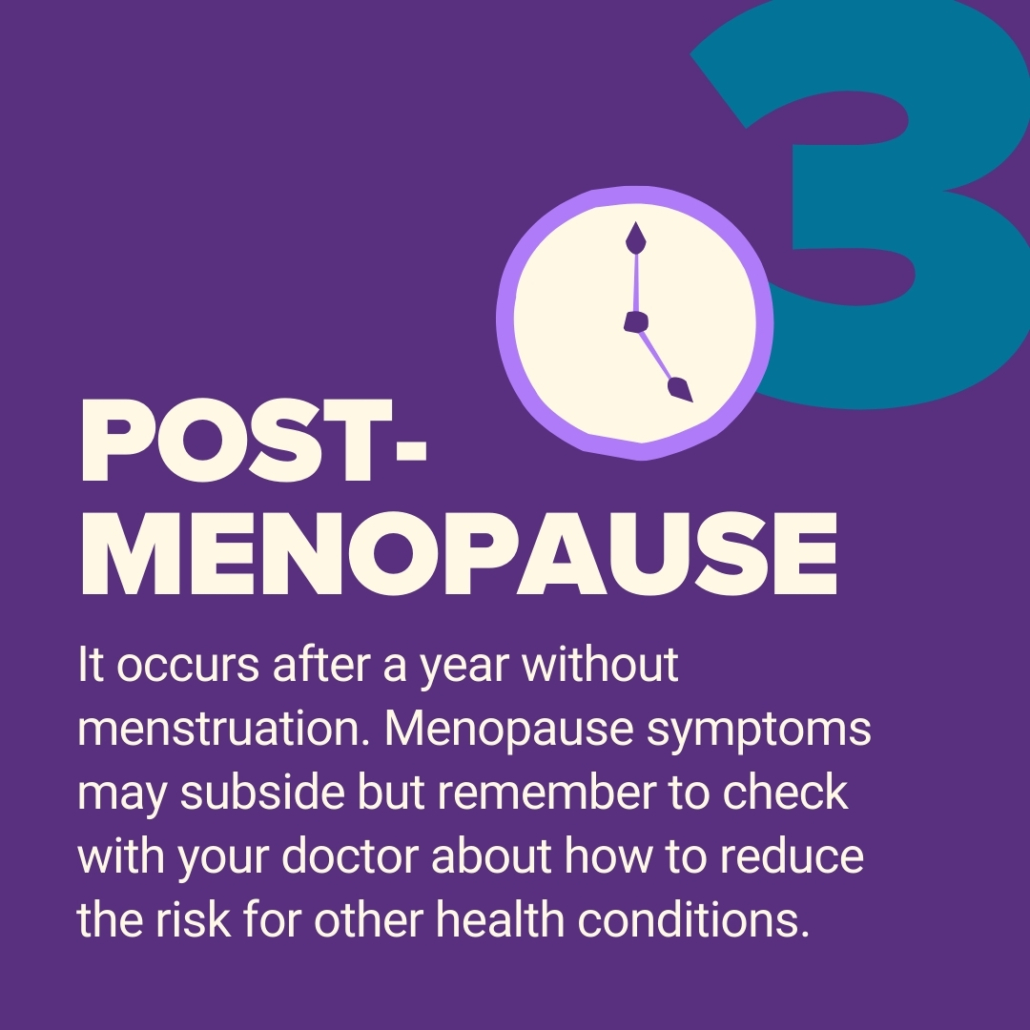
- Q&A: At 20 Years, WHI Emphasizes Personalized Postmenopausal Care, Shared Decision-Making [03 June 2024]
- The Women’s Health Initiative Randomized Trials and Clinical Practice [01 May 2024]
- Video Series-2024: Preparing for Your Menopause Health Care Visit [13 January 2024]
- Videos & Podcasts: Videos – Interviews: Metabolic Syndrome in Midlife Women [April 2024]
- Webinars: Previous – Non-Pharmacological Interventions For VMS
- An Online Survey of Postmenopausal Women To Determine Their Attitudes and Knowledge of the Menopause
- Are You Up To Date on Your Preventive Care?
- Askearlymenopause.org [Ask EM] [+ Video: What Is Early Menopause?]
- BMS Statement on Testosterone
- BMS TV: Coronary Heart Disease (CHD)
 BMS TV: Testosterone Explained
BMS TV: Testosterone Explained- BMS TV: Urogenital Atrophy
- Bioidentical Hormones: Are They Safer?
- Build Better Bones.org [International Osteoporosis Foundation]
- Cognitive Behaviour Therapy (CBT) for Menopausal Symptoms
- Deciding About Hormone Therapy Use
- Find A Menopause Practitioner [United States and Other]
- Find An AMS Doctor [Australasian Menopause Society i.e. Australia and New Zealand]
- Find Your Nearest BMS Menopause Specialist [British Menopause Society]
- Goredforwomen.org [Go Red for Women, United States]
- Guidance on Menopausal Hormone Therapy
- HRT & Menopause Extra
- Health After Menopause
- Healthy Living By Age: Healthy Living In Your 50s
- Healthy Living By Age: Healthy Living In Your 60s
- Heart Disease and Stroke In Women
- Hormone Therapy In Postmenopausal Persons: Primary Prevention of Chronic Conditions
- Hormone Therapy: Is It Right for You?
- Hot Flashes
- Hot Flashes
- Hot Flashes: What Can I Do? [+ Video: What Are the Signs and Symptoms of Menopause?]
- How Menopause Impacts Your Health
- I Forgot To Ask the Doctor – E9: The Menopause: Can Every Woman That Wants It Have HRT?
- Is Menopause Making Me Put on Weight? No, But It’s Complicated
- Joint Position Statement By the British Menopause Society, Royal College of Obstetricians and Gynaecologists and Society for Endocrinology on Best Practice Recommendations for the Care of Women Experiencing the Menopause
- Later Years (Around 50 Years and Over): Menopause and Post Menopause Health – After the Menopause [Other Languages and Formats]
- Later Years (Around 50 Years and Over): Menopause and Post Menopause Health – Sexual Wellbeing, Intimacy and Menopause [+ Video: Menopause Is the End of Your Sex Life] [Other Languages and Formats]
- Life’s Essential 8
- Living With A Chronic Condition
- Maintaining A Healthy Diet and Weight
- May is Osteoporosis Awareness and Prevention Month
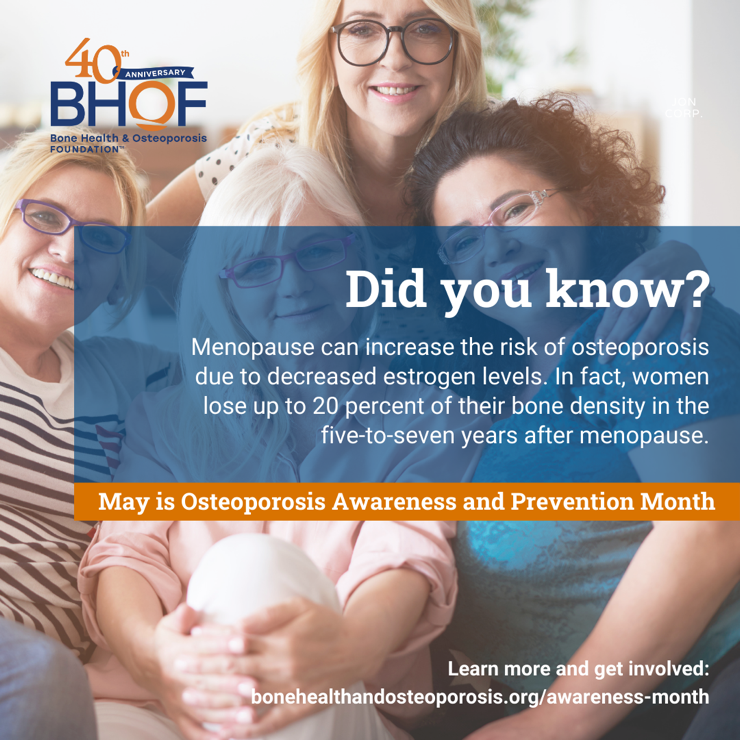
- Mayo Clinic Minute: Combating Weight Gain During Menopause [+ Video Courtesy: Mayo Clinic News Network]
- Mayo Clinic Minute: Help With Hot Flashes Due To Menopause [+ Video]
- Mayo Clinic Minute: How Lifestyle Changes May Help Manage Menopause Symptoms [+ Video]
- Mayo Clinic Minute: Relationship Between Food, Disease Stronger Than You May Think
- Menopause
- Menopause Map: Downloadable Resources – My Personal Path Print Tools: Symptom Tracker
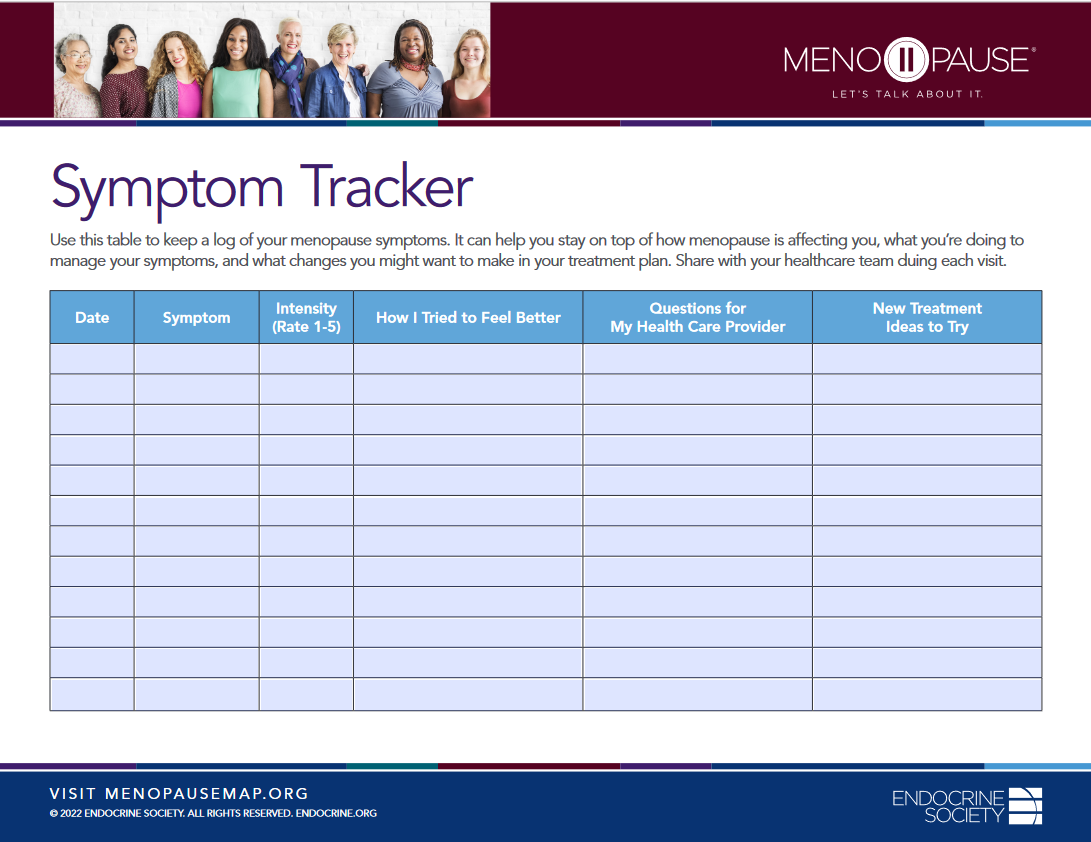
- Menopause Map: Downloadable Resources – Stages of Menopause: Postmenopause
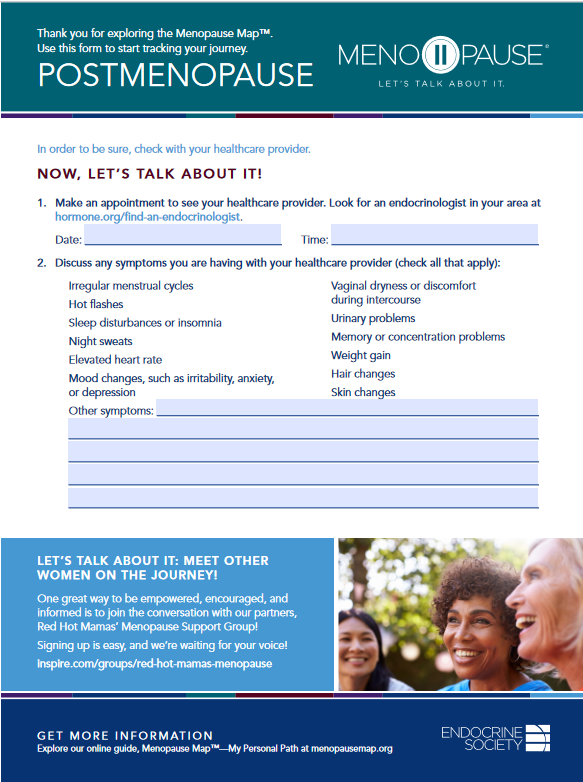
- Menopause Patient Information [Videos] 2. Talking To Your GP About Menopause
- Menopause Preparedness Toolkit Video Series: Common Conditions Associated with Menopause and Midlife
- Menopause Symptoms: Mayo Clinic Expert Outlines Hormone and Nonhormonal Therapies
- Menopause Treatments: What Works, What Doesn’t
- Menopause: Ensuring A Tranquil Transition
- Menopause: Understanding the Changes and Finding Relief | Dr Susan Davis | The Proof Podcast EP 256
- Mymenoplan.org [My Menoplan, United States]
- National Women’s Health Week [12-18 May 2024, United States]: Day 6 – May 17: Reproductive Health From Puberty To Menopause and Beyond
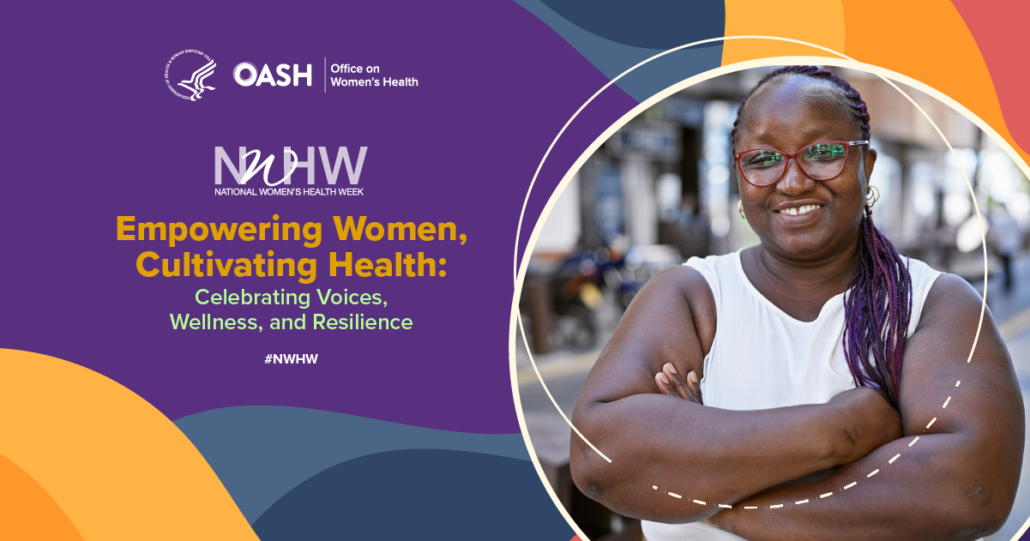
- Navigating Menopause: Expert Insights and Solutions | Dr Susan Davis | The Proof Podcast EP 245
- Navigating Menopause: Honest Answers To All Your Questions [+ Video: What To Expect in Menopause]
- Nonhormone Treatments for Hot Flashes and Night Sweats
- Osteoporosis
- Pathtogoodbonehealth.org [Your Path To Good Bone Health, Bone Health & Osteoporosis Foundation, United States]
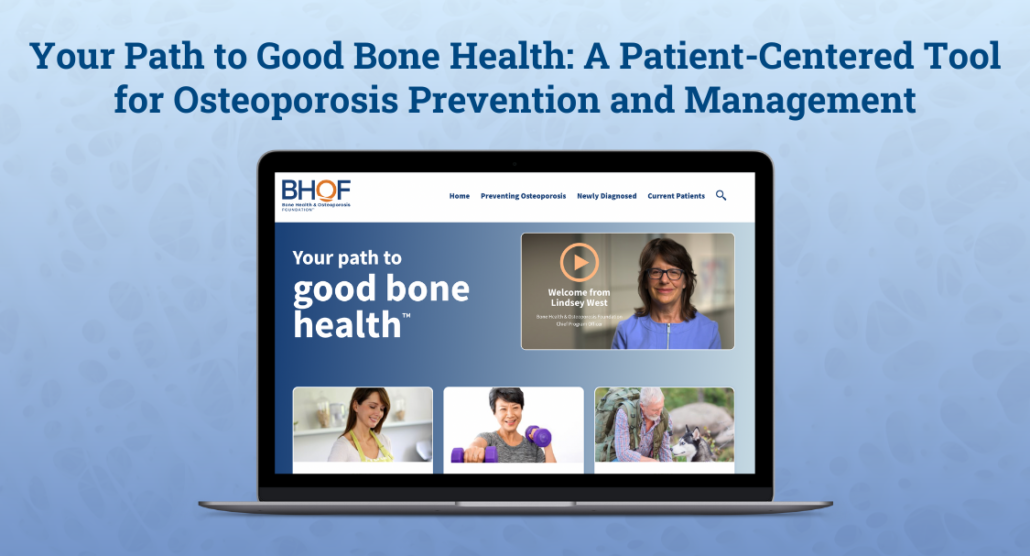
- People Who Follow These 8 Heart Health Metrics May Live Years Longer
- Postmenopausal Heart Health: What To Expect
- Postmenopause
- Postmenopause: Symptoms and Impact
- Prosayla Supported By ISSWSH [International Society for the Study of Women’s Sexual Health]
- Q&A: At 20 Years, WHI Emphasizes Personalized Postmenopausal Care, Shared Decision-Making
- Screening for Osteoporosis
- Severe Hot Flashes After Menopause Increase Metabolic Syndrome Risk In Women, Finds Long-Term Study
- Staying Healthy During and After Menopause
- Taking It To Heart: Addressing Cardiovascular Disease In Women [+ Video]
- Testosterone and the Menopause
- The Benefits and Risks of Menopause Hormone Therapy for the Cardiovascular System In Postmenopausal Women: A Systematic Review and Meta-Analysis
- The Connection Between Menopause and Cardiovascular Disease Risks
- The Reality of Menopause Weight Gain
- The Women’s Health Initiative Randomized Trials and Clinical Practice
- Tip Sheet: What To Know About Post-Menopause Health Risks
- Tips To Help Manage Menopause Symptoms
- Top 4 Tips To Prevent Chronic Diseases
- Using Natural Therapies In the Menopause Transition – Webinar
- Vaginal Dryness
- Vaginal Dryness After Menopause: How To Treat It?
- Vaginal Dryness: What To Do About It
- Video Series-2023: Menopause and Heart Disease
- Video Series-2023: NAMS 2023 Nonhormone Therapies Position Statement for Bothersome Menopause Symptoms
- Video Series-2023: New FDA-Approved Nonhormone Option for the Treatment of Hot Flashes
- Video Series-2023: Premature and Early Menopause
- Video Series-2024: Preparing for Your Menopause Health Care Visit
- Video & Podcast Library: Interviews – Video: Genitourinary Syndrome of Menopause
- Video & Podcast Library: Interviews – Videos: Testosterone and Women
- Video: Menopause Symptoms May Be Associated With Later Health Risks
- Videos and Podcasts: Videos – Interviews: A Simple Approach To Menopause: The Menopause Quick Six (www.MQ6.ca)
- Videos & Podcasts: Videos – Interviews: Cardiovascular Disease In Women
- Videos & Podcasts: Videos – Interviews: Metabolic Syndrome In Midlife Women
- Videos & Podcasts: Videos – Interviews: Preventing Bone Loss At Menopause
- Videos and Podcasts: Videos – Interviews: How To Protect Your Brain Health At Menopause and Beyond
- Want To Live Longer? Exercise Is Key, Study Confirms
- Webinars: Previous – Approach To Bone Health In the Perimenopause and Postmenopause?
- Webinars: Previous – Cardiovascular Disease
- Webinars: Previous – Non-Hormonal Pharmacological Interventions For VMS
- Webinars: Previous – Non-Pharmacological Interventions For VMS
- What To Expect In Each Stage of Menopause
- World Menopause Day [18 October 2023]

- World Menopause Day: Patient Information Leaflet – Cardiovascular Disease: What Women Need To Know [Multiply Languages]
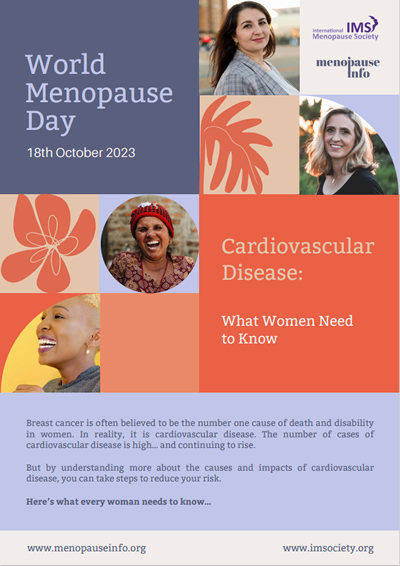
Sources
Where may I find the Sources quoted?
You may find the Sources quoted at:
Sources
- What Is Menopause? The Menopause Transition – Postmenopause. Last Updated: 18 January 2024 | Last Reviewed: 19 August 2022. Jean Hailes for Women’s Health https://www.jeanhailes.org.au/health-a-z/menopause/about-menopause#the-menopause-transition Accessed: 18 May 2024
- Menopause Terminology: Glossary of Terms. Page 4. International Menopause Society https://www.imsociety.org/education/menopause-terminology/ Accessed: 18 May 2024
- Menopause FAQs: An Introduction To Menopause – Q. What Is Postmenopause? North American Menopause Society https://www.menopause.org/for-women/menopause-faqs-an-introduction-to-menopause Accessed: 18 May 2024
- What Is Menopause? Content Created May 2022. Australasian Menopause Society https://www.menopause.org.au/hp/information-sheets/185-what-is-menopause Accessed: 18 May 2024
- Lobo, R. A., Davis, S. R., De Villiers, T. J., Gompel, A., Henderson, V. W., Hodis, H. N., Lumsden, M. A., Mack, W. J., Shapiro, S. and Baber, R. J. Prevention of Diseases After Menopause: Introduction. 2014:2 https://www.imsociety.org/wp-content/uploads/2020/07/wmd-2014-white-pages-english.pdf Accessed: 18 May 2024
- What Is Menopause? The Menopause Transition – Postmenopause. Last Updated: 18 January 2024 | Last Reviewed: 19 August 2022. Jean Hailes for Women’s Health https://www.jeanhailes.org.au/health-a-z/menopause/about-menopause#the-menopause-transition Accessed: 18 May 2024
- Menopause: Ensuring A Tranquil Transition: Are There Any Health Risks Associated With Menopause? 26 April 2023. Mayo Clinic https://newsnetwork.mayoclinic.org/discussion/menopause-ensuring-a-tranquil-transition/ Accessed: 18 May 2024
- Postmenopausal Bleeding: What Causes Postmenopausal Bleeding? Last Reviewed 05 October 2021. Cleveland Clinic https://my.clevelandclinic.org/health/diseases/21837-postmenopause Accessed: 18 May 2024
- Maintaining Health and Preventing Disease After the Menopause. 2014:2. International Menopause Society https://www.imsociety.org/wp-content/uploads/2020/07/wmd-2014-leaflet-english.pdf Accessed: 18 May 2024



